Ann Lethbridge's Blog, page 27
January 11, 2012
What No Pirates?
Apparently there are, since they stole my blog post before it was done. Apologies for the double post.
Behind the Book
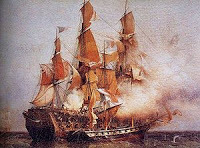 Let me start by saying, I've always had a soft spot for pirates. I know lots of people don't and that's fine. But I loved Treasure Island as a child. Definitely had a soft spot for Long John Silver, such a great villain. And what's not to love about Johnny Depp. Oh there were others before him too, including a moving with Gina Davis that I really liked.
Let me start by saying, I've always had a soft spot for pirates. I know lots of people don't and that's fine. But I loved Treasure Island as a child. Definitely had a soft spot for Long John Silver, such a great villain. And what's not to love about Johnny Depp. Oh there were others before him too, including a moving with Gina Davis that I really liked.
HMS Kent battles a French Privateer c. 1800 (from Wikipedia)
Anyway, you can imagine my disappointment when research revealed that by the Regency, the Golden Age of pirating was done. I mean there were pirates, in the China sea and off North Africa, but they weren't quite right dashing around off the coast of Britain and popping up in the English countryside. But I wanted to write a pirate story, I whined.
But there were privateers.
Privateers were men who owned and or captained ships and fought for their country, but not in uniform. Needless to say it was a profitable if dangerous occupation, since they got to keep their prize as long as it was deemed legitimate under their Leter of Marque. Privateering had gone on since at least the 16th century, inded it had been greatly encouraged before their were navies as we know them today, and was still legal up until around 1856.
So how did privateering work? Governments would issue A Letter of Marque to a ship owner. They were given permission to capture ships of the enemy, usually within a certain area, if they had reason to suspect the ship was aiding the enemy's war effort, such as carrying arms or soldiers, or supplies. Which pretty well seems to cover all possibilities.
They were a bit like sea going mercenaries I supposed and were originally called Private Men of War (shortened to privateer). They had to be careful, because governments could revoke the licence just as quickly as it was handed out, or make unexpected peace with the enemy, which left the privateer left footed if they didn't know. If they operated without their license, they were considered pirates. Quite often an enemy would consider them a pirate, even if they did have their government's license.
If a privateer was caught by the enemies navy, the seamen were usually given the option of join the opposing navy as a sailor or be treated as a prisoner of war. A rather horrid fate.
Privateers did a great deal of damage to the opposing side and many of them came home rich. Their pay was based on the prize system.
What sounds like a pirate, acts like a pirate, but isn't a pirate? Why, a Regency Privateer. So I got to write my pirate story after all. and Captured for the Captain's Pleasure is it. This book is set right at the end of the war of 1812-1814 and my hero has actually been working under an American licence.
One of these day I might get to write one about a real pirate. It just won't be a Regency story.
Until Next Time, Happy Rambles
Behind the Book
 Let me start by saying, I've always had a soft spot for pirates. I know lots of people don't and that's fine. But I loved Treasure Island as a child. Definitely had a soft spot for Long John Silver, such a great villain. And what's not to love about Johnny Depp. Oh there were others before him too, including a moving with Gina Davis that I really liked.
Let me start by saying, I've always had a soft spot for pirates. I know lots of people don't and that's fine. But I loved Treasure Island as a child. Definitely had a soft spot for Long John Silver, such a great villain. And what's not to love about Johnny Depp. Oh there were others before him too, including a moving with Gina Davis that I really liked. HMS Kent battles a French Privateer c. 1800 (from Wikipedia)
Anyway, you can imagine my disappointment when research revealed that by the Regency, the Golden Age of pirating was done. I mean there were pirates, in the China sea and off North Africa, but they weren't quite right dashing around off the coast of Britain and popping up in the English countryside. But I wanted to write a pirate story, I whined.
But there were privateers.
Privateers were men who owned and or captained ships and fought for their country, but not in uniform. Needless to say it was a profitable if dangerous occupation, since they got to keep their prize as long as it was deemed legitimate under their Leter of Marque. Privateering had gone on since at least the 16th century, inded it had been greatly encouraged before their were navies as we know them today, and was still legal up until around 1856.
So how did privateering work? Governments would issue A Letter of Marque to a ship owner. They were given permission to capture ships of the enemy, usually within a certain area, if they had reason to suspect the ship was aiding the enemy's war effort, such as carrying arms or soldiers, or supplies. Which pretty well seems to cover all possibilities.
They were a bit like sea going mercenaries I supposed and were originally called Private Men of War (shortened to privateer). They had to be careful, because governments could revoke the licence just as quickly as it was handed out, or make unexpected peace with the enemy, which left the privateer left footed if they didn't know. If they operated without their license, they were considered pirates. Quite often an enemy would consider them a pirate, even if they did have their government's license.
If a privateer was caught by the enemies navy, the seamen were usually given the option of join the opposing navy as a sailor or be treated as a prisoner of war. A rather horrid fate.
Privateers did a great deal of damage to the opposing side and many of them came home rich. Their pay was based on the prize system.
What sounds like a pirate, acts like a pirate, but isn't a pirate? Why, a Regency Privateer. So I got to write my pirate story after all. and Captured for the Captain's Pleasure is it. This book is set right at the end of the war of 1812-1814 and my hero has actually been working under an American licence.
One of these day I might get to write one about a real pirate. It just won't be a Regency story.
Until Next Time, Happy Rambles
Published on January 11, 2012 20:52
January 10, 2012
Happy New Year
I had planned to write long before this, but after New Year I came down with a horrible cold that seized my brain. But I am back now and raring to go.
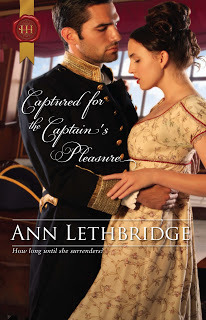
Captured for the Captain's Pleasure is in stores now and to celebrate I am going to give you a little excerpt that you won't find elsewhere. Enjoy with my compliments.
To Purchase this book you have all kinds of choices. Here are a few links for you to try:





Amazon.com From Barnes and Noble
From Barnes and Noble

Until Next Time, Happy Rambles


Captured for the Captain's Pleasure is in stores now and to celebrate I am going to give you a little excerpt that you won't find elsewhere. Enjoy with my compliments.
"Drink your wine, Miss Fulton." He gestured at her glass. "Come a toast."© Michele Ann Young
To humour him, she picked up her glass.
"To success," he said.
"Yours or mine?"
"Mine." He drank deeply. He seemed lost in his thoughts.
The skin on her scalp tightened the way it did before a lightning storm. Somehow she had to end this tête-a-tête on a friendly note.
She picked up her glass and carried it to the window. Her legs felt rubbery, like the first moments on land after a long voyage. Unfortunately, this voyage would continue and a storm loomed on the horizon.
She gazed out into the dark, breathing in the warm salt air. "Thank you for a pleasant evening."
As quiet as a cat he appeared behind her, his face reflected in the glass over her shoulder, his lips curved in a sweet almost boyish smile. A trick of the light, no doubt, but the memory of those firm demanding lips on hers, his hard body pressed against her, fired off a storm of heat. A demented blush from head to toe. Thankfully, hidden in the dark reflection.
"You were right about me," he said, his voice low, his body warm at her back. "Once, I also had all the advantages of wealth and position."
She resisted the urge to sympathize despite the sorrow in his voice. "Did you lose your money in one of London's hells? Is that why you prey on ships? Stealing what you lost?"
His reflected gaze skewered her like a blade. "I will never replace what I lost."
The depth of pain in those words swept across her skin like the sand of a desert storm. "You lost the family estate? It happens all the time. Fortunes won and lost in a night." Men who committed suicide in the cold light of the following day.
At least Father preferred the comfort of brandy. She shuddered.
The silence stretched taut and painful. The urge to fill it, to pretend thing were normal brought words to her lips. "What will you do when the war is over? When there are no more letters marque? No more ships to be taken. What are your plans for peace?"
The long exhale of breath, a sigh of longing he probably wasn't aware of. "I plan to return to England. I have unfinished business there."
"You think you will be welcome?"
"I think you have lied to me all evening, Miss Fulton.
To Purchase this book you have all kinds of choices. Here are a few links for you to try:





Amazon.com
 From Barnes and Noble
From Barnes and Noble
Until Next Time, Happy Rambles
Published on January 10, 2012 11:22
December 24, 2011
Merry Christmas
[image error]
Have a Wonderful Holiday and I will be back in the New Year
Published on December 24, 2011 09:33
December 21, 2011
Favorite Festive Foods
Blogging at Harlequin.com. Drop in and tell me about your favorite foods.
Published on December 21, 2011 02:00
December 14, 2011
Longleat
Don't forget to enter the Harlequin Holiday Give Away. Go to my website to find all the authors participating and all the wonderful Prizes.
 Perhaps one of the most beautiful houses I have visited, though each has its own charm, is Longleat. Now I have to say, I did not visit the zoo or the safari or any of that stuff. As always my interest is the house and the grounds and any interesting tidbits of family history.
Perhaps one of the most beautiful houses I have visited, though each has its own charm, is Longleat. Now I have to say, I did not visit the zoo or the safari or any of that stuff. As always my interest is the house and the grounds and any interesting tidbits of family history.
It was quite misty as we drove in and I loved this view of the house from high on the hill. I could almost imagine myself in a coach and four to attend a house party given by the second Marquess of Bath. More likely I'd been lighting the fires, but ah well, it is fun to dream.
It is not possible to take pictures inside the house, since it is still the property of the Marquess of Bath, unlike so many other of the great homes which their noble owners could no long afford to keep. I for one am glad that some have managed to find ways to retain their ancestral homes.
 Longleat has seven libraries with over 40,000 books some of which go back five centuries to when the family first built the house. I can pretty well guarantee that they don't own one of my books. No hard feelings though.
Longleat has seven libraries with over 40,000 books some of which go back five centuries to when the family first built the house. I can pretty well guarantee that they don't own one of my books. No hard feelings though.
The wall covering in the dining room was particularly interesting, because it was so unusual, tooled Spanish leather made in Cordoba around 1620. Furniture and paintings fill magnificent rooms and it was a pleasure to walk through them.
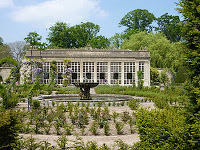
This is a picture of the wisteria which climbs the orangery wall and the next view is of the orrangery itself. We have seen several of these in various blogs, but this is a very large and beautiful one at the back of a formal garden.
It was the second Marquess of Bath who spanned the Regency era and into the Victorian age, he brought much of the house up to date at that time and of course it has been renovated since.
 Perhaps one of the most beautiful houses I have visited, though each has its own charm, is Longleat. Now I have to say, I did not visit the zoo or the safari or any of that stuff. As always my interest is the house and the grounds and any interesting tidbits of family history.
Perhaps one of the most beautiful houses I have visited, though each has its own charm, is Longleat. Now I have to say, I did not visit the zoo or the safari or any of that stuff. As always my interest is the house and the grounds and any interesting tidbits of family history.It was quite misty as we drove in and I loved this view of the house from high on the hill. I could almost imagine myself in a coach and four to attend a house party given by the second Marquess of Bath. More likely I'd been lighting the fires, but ah well, it is fun to dream.
It is not possible to take pictures inside the house, since it is still the property of the Marquess of Bath, unlike so many other of the great homes which their noble owners could no long afford to keep. I for one am glad that some have managed to find ways to retain their ancestral homes.
 Longleat has seven libraries with over 40,000 books some of which go back five centuries to when the family first built the house. I can pretty well guarantee that they don't own one of my books. No hard feelings though.
Longleat has seven libraries with over 40,000 books some of which go back five centuries to when the family first built the house. I can pretty well guarantee that they don't own one of my books. No hard feelings though.The wall covering in the dining room was particularly interesting, because it was so unusual, tooled Spanish leather made in Cordoba around 1620. Furniture and paintings fill magnificent rooms and it was a pleasure to walk through them.

This is a picture of the wisteria which climbs the orangery wall and the next view is of the orrangery itself. We have seen several of these in various blogs, but this is a very large and beautiful one at the back of a formal garden.
It was the second Marquess of Bath who spanned the Regency era and into the Victorian age, he brought much of the house up to date at that time and of course it has been renovated since.
Published on December 14, 2011 20:01
December 5, 2011
New Book Out
[image error]
A Rake for Christmas
It is always special when a book comes out. This one is a short story, my very first Christmas themed book. I got the idea for the setting when I visited Keates's house on Hampstead Heath one summer. Not that my rakish hero is a poet. Far from. He's a very bad boy.
But like Keates he does share his house with a very lovely lady. The house is divided into two apartments, not up and down, but side by side. He has been watching her chase her cat in the garden, and calls her the cat lady, and she has been listening to his shenanigans through the walls of her house.
Their meeting is explosive, to say the least:
 Not that the path to true love is ever that smooth as he is about to find out.
Not that the path to true love is ever that smooth as he is about to find out.
Well that's all from me, until next time happy rambles.
A Rake for Christmas
It is always special when a book comes out. This one is a short story, my very first Christmas themed book. I got the idea for the setting when I visited Keates's house on Hampstead Heath one summer. Not that my rakish hero is a poet. Far from. He's a very bad boy.
But like Keates he does share his house with a very lovely lady. The house is divided into two apartments, not up and down, but side by side. He has been watching her chase her cat in the garden, and calls her the cat lady, and she has been listening to his shenanigans through the walls of her house.
Their meeting is explosive, to say the least:
One more try and then she'd go home. She knocked harder and longer.
The door flew open as if blown back by the wind. "I knew you'd be back," a deep mocking voice said.
He stepped into the lamplight.
Mouth open she stared at the most beautiful man she'd ever seen. A blond blue-eyed archangel. Elegant of stature, he looked thoroughly masculine in his shirtsleeves and open collar. Perfection in a state of disreputable undress. Not the raddled roué she'd expected, but a Greek god and a dangerous pirate all rolled into one.
A gust of wind drove snow in through his door and flakes clung to his long golden lashes. So pretty. So enticing. Heat rushed through her body. Like a bolt of hot lightning, longing trembled in her bones.
Yearning for something she could not have.
"Only one of you?" Summer-sky eyes tracked down her length from head to toe.
Oh how she wished she'd worn something less shabby than her old cat-catching shawl. "I—"
A smile of appreciation curved his sensual mouth. "Well, since Heaven sent you, I'm sure you'll make up for the lack. Come on in before you freeze." He grabbed her by the hand and pulled her over the threshold and closed the door.
Astonished she gazed up at him. Before she could utter a protest, his hands went to her waist and he brushed his warm dry lips across her mouth. A sigh of appreciation forced its way up her throat. She barely managed to contain it.
Instinctively, she placed her free hand on his shoulder, intending to push him away, parting her lips to to tell him to stand back. She was sure that was what she meant to do, but when his tongue swept her mouth, warm and silky and tasting of brandy, the spicy scent of his cologne filling her nostrils, instead of pushing, her fingers curled into the soft cambric of his shirt and pulled him closer. Memories of the pleasure of kisses and caresses melting any thought of resistance.
Slowly, lingeringly, he kissed her, exploring her mouth with the leisurely strokes of a master seducer. Finally he broke the kiss and she stood breathless, dizzy, held up only by the strong hands in the indentation beneath her ribs. It was all she could do to keep her feet, to not collapse from the delicious assault on her senses.
His kiss had set free all the pent up desires of the past few weeks. Her insides ached and fluttered.
He looked down at her, a lock of unruly tawny hair falling over his brow, a wicked smile curving his sensually carved mouth. "I just had to see if you tasted as good as you looked." His smile broadened. "You do. Lucky me."
 Not that the path to true love is ever that smooth as he is about to find out.
Not that the path to true love is ever that smooth as he is about to find out.Well that's all from me, until next time happy rambles.
Published on December 05, 2011 05:33
November 27, 2011
Will I ever finish?
I have had this project ongoing for some time now. Years in fact. And I am beginning to wonder if I will ever finish. I never have that problem with finishing my stories, but this, well it would be a great shame not to finish it now and have it framed, don't you think? (And I have a few more that I would like to tackle too.)
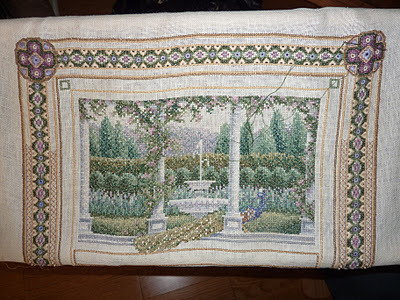 Seeing the NaNoWriMo excitement, I thought I would try to give myself a bit of encouragement. I am going to post my progress from time to time. Once a month. Here is a picture of where I am at the moment.
Seeing the NaNoWriMo excitement, I thought I would try to give myself a bit of encouragement. I am going to post my progress from time to time. Once a month. Here is a picture of where I am at the moment.
The thing is, it is dreadfully fiddly counted cross stitch and its hard to see if you are making any progress at all. This is only the top one third of the whole piece.
All of the cross stitch is done, now we are embellishing.
Next, I have to finish the outside border, there is some outlining to be done around the very edge and then that criss cross stuff you can see that stops before it reaches the top, and then there are beads to add. Anyway, by this time next month, I hope to have the outside border completely finished and then I can start on outlining the greenery and finishing off the peacock inside the large picture panel.
It will be interesting to see if this helps motivate me to get this done. One year. That is what I am aiming for.
More about the Regency next time.
 Seeing the NaNoWriMo excitement, I thought I would try to give myself a bit of encouragement. I am going to post my progress from time to time. Once a month. Here is a picture of where I am at the moment.
Seeing the NaNoWriMo excitement, I thought I would try to give myself a bit of encouragement. I am going to post my progress from time to time. Once a month. Here is a picture of where I am at the moment.The thing is, it is dreadfully fiddly counted cross stitch and its hard to see if you are making any progress at all. This is only the top one third of the whole piece.
All of the cross stitch is done, now we are embellishing.
Next, I have to finish the outside border, there is some outlining to be done around the very edge and then that criss cross stuff you can see that stops before it reaches the top, and then there are beads to add. Anyway, by this time next month, I hope to have the outside border completely finished and then I can start on outlining the greenery and finishing off the peacock inside the large picture panel.
It will be interesting to see if this helps motivate me to get this done. One year. That is what I am aiming for.
More about the Regency next time.
Published on November 27, 2011 21:37
November 23, 2011
Daphne Du Maurier
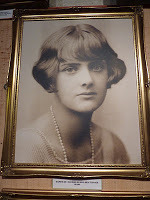 You may recall that my first book with Harlequin,
The Rake's Inherited Courtesan,
won the 2010 Daphne, or as the full title explains, the Daphne Du Maurier Award for Excellence in Mystery/Suspense, Historical Category (Awarded by RWA's Kiss of Death Chapter.)
You may recall that my first book with Harlequin,
The Rake's Inherited Courtesan,
won the 2010 Daphne, or as the full title explains, the Daphne Du Maurier Award for Excellence in Mystery/Suspense, Historical Category (Awarded by RWA's Kiss of Death Chapter.) Daphne Du Maurier, pictured left as a teen, wrote suspense novels. Several of her novels have been made into films, including The Birds and Rebecca . The story that interested me most was Jamaica Inn .
Jamaica Inn , was almost set in the Regency, 1820 in fact, and it is a romance. The story is classified as a gothic romance and tells the tale of a young woman who gets tangled up with a gang of wreckers. (Men who used lanterns to misdirect ships on to the rocks of the Cornish coast, kill the crew and steal the cargo.) The heroine encounters many harrowing adventures.
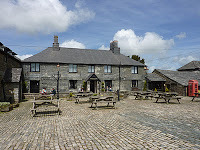 Jamaica Inn, where she set her story exists today, and is still a pub, but is also a museum to both the author and the smuggling history of Cornwall.
Jamaica Inn, where she set her story exists today, and is still a pub, but is also a museum to both the author and the smuggling history of Cornwall.Last summer we visited Cornwall, and naturally Jamaica Inn was a must see.
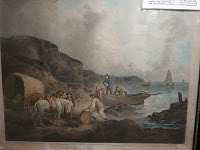
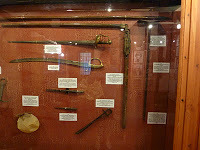 As you can imagine, while I was interested in the author and her life, I was more taken with the artifacts and information relating to smuggling which I am going to share with you. here.
As you can imagine, while I was interested in the author and her life, I was more taken with the artifacts and information relating to smuggling which I am going to share with you. here. The picture on the left known as landing the goods and there is little more to be said. On the right are tools and weapons used on both sides of the law. For example the pig sticking knife and the wooden farm flail were used by smugglers, since they were not army or navy weapons a man could carry them with impunity. The swords and cutlasses were carried by excisemen or naval officers.
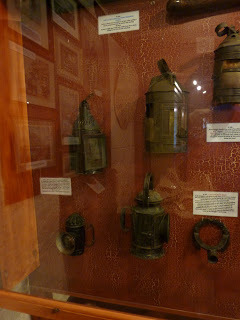
Here is an assortment of lanterns, handy for smugglers to carry or signal with.
Down in the right hand corner is something really interesting. It is called a scuffling iron. Now this is the technical term for what the last man of the train of smugglers used to hide their tracks. It was a reverse horse shoe, and with one hand he would sweep away the track of the horsed with a tree branch and with the other would stamp the scuffling iron (which was attached to something like a broom handle) into the ground, thereby confusing anyone trying to follow.
Not exactly high tech, and not likely to fool too many people either I think, but who knows?
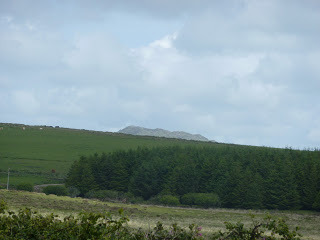
The Jamaica Inn is on Bodmin Moor, not that close to the sea, so it would have been used as a place to hide contraband, I would think. And a very lonely place it is too, even today, as you can see from the pictures I took from the parking lot.
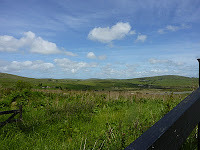
There will be more on smuggling another time, but for now, Happy Rambles.
Published on November 23, 2011 20:22
November 21, 2011
The Bankes's of Kingston Lacy (Continued)
[image error]
Holiday Contest Reminder
Just a reminder to check back for details, either here or on my website on November 29 when the annual Harlequin Historical Contest begins. There are all kinds of prizes from each author every day, plus a grand prize of a Kindle Fire (where available) and an equivalent where it is not.
I will also be posting on twitter and facebook too.
Back to William Bankes
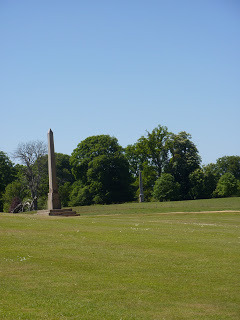
The Philae obelisk.
Made of pink granite, the obelisk was first seen by William Bankes in 1815. It arrived in England in 1821, after almost sinking to the bottom of a river in Egypt, and was transported overland to Kingston Lacy on a gun carriage offered by the Duke of Wellington. The foundation stone was laid by the Duke in April 1827.
Can you imagine what your family would say if you brought this sort of souvenir home from your holiday?
As mentioned earlier. William Bankes's travels came to an end in 1820. He did not inherit Kingston Lacy from his brother Henry until December 1834 and spent the next few years embellishing Soughton in Flintshire, instead writing up the details of his travels, sadly for us, I think.
Once he inherited, he began the task of altering Kingston Lady to suit his own tastes. Personally, I wish he might have left it as it was but that is purely selfish. I would not expect anyone to tell me I couldn't update my house.
Unfortunately, William was forced to leave England in 1841 after a second charge of "indecently exposing himself with a soldier of the Foot Guards in Green Park". The possible punishments were dreadful at the time and his reputation in society would have been ruined. He jumped bail and fled to Italy. The rest of his life he continued to fit out the interiors of Kingston Lacy with the help of his sister Lady Falmouth. There is some evidence that he did pay secret visits to the house on which he lavished so much care, but as a fugitive from the law, the family could never openly admit it. I certainly hope he did get to see his home from time to time.
There is more to know about the family and the house, and it is well worth a visit, for the grounds are simply spectacular, but for my purposes, all things 'regency', it is done.
Until next time, Happy Rambles.
Just a reminder to check back for details, either here or on my website on November 29 when the annual Harlequin Historical Contest begins. There are all kinds of prizes from each author every day, plus a grand prize of a Kindle Fire (where available) and an equivalent where it is not.
I will also be posting on twitter and facebook too.
Back to William Bankes

The Philae obelisk.
Made of pink granite, the obelisk was first seen by William Bankes in 1815. It arrived in England in 1821, after almost sinking to the bottom of a river in Egypt, and was transported overland to Kingston Lacy on a gun carriage offered by the Duke of Wellington. The foundation stone was laid by the Duke in April 1827.
Can you imagine what your family would say if you brought this sort of souvenir home from your holiday?
As mentioned earlier. William Bankes's travels came to an end in 1820. He did not inherit Kingston Lacy from his brother Henry until December 1834 and spent the next few years embellishing Soughton in Flintshire, instead writing up the details of his travels, sadly for us, I think.
Once he inherited, he began the task of altering Kingston Lady to suit his own tastes. Personally, I wish he might have left it as it was but that is purely selfish. I would not expect anyone to tell me I couldn't update my house.
Unfortunately, William was forced to leave England in 1841 after a second charge of "indecently exposing himself with a soldier of the Foot Guards in Green Park". The possible punishments were dreadful at the time and his reputation in society would have been ruined. He jumped bail and fled to Italy. The rest of his life he continued to fit out the interiors of Kingston Lacy with the help of his sister Lady Falmouth. There is some evidence that he did pay secret visits to the house on which he lavished so much care, but as a fugitive from the law, the family could never openly admit it. I certainly hope he did get to see his home from time to time.
There is more to know about the family and the house, and it is well worth a visit, for the grounds are simply spectacular, but for my purposes, all things 'regency', it is done.
Until next time, Happy Rambles.
Published on November 21, 2011 05:44
November 17, 2011
The Bankes's of Kingston Lacy (Continued)
 William Bankes traveled the east en grand seigneur in a noble barge with a cabin, not because he wanted to, but because it was expected. He also visited Lady Hester Stanhope, a fascinating lady who lived on Mount Lebanon.
William Bankes traveled the east en grand seigneur in a noble barge with a cabin, not because he wanted to, but because it was expected. He also visited Lady Hester Stanhope, a fascinating lady who lived on Mount Lebanon.After his travels he returned to Syria where he carried out clandestine nocturnal excavations with other English gentlemen who were also in the area at the time. He was one of the first Europeans to reach Petra famous for its rock cut architecture and water conduits system. Imagine being among the first to see a sight like that pictured to the left.
Established sometime around the 6th century BC Petra was the capital city of the Nabataeans and is to be found east of the Dead Sea. I must say I am greatly resisting the temptation to delve deeper, but no. This is about William, not Arabia. He really did have adventures. William went to Petra dressed as a Bedouin Arab. He also went because he was so skilled in drawing and was to use his talent to capture the sights on paper, there not being any photographs at the time. But you knew that didn't you.
 Next he went up the Nile, leading Henry Salt's flotilla in his fourteen-oared
Next he went up the Nile, leading Henry Salt's flotilla in his fourteen-oared
 canja among whom were artists and Belzoni, a hydraulic engineer who had once been a strong man on the stage of Sadler's Wells. Williams plan of the temple at Luxor corrected that of the French antiquary Vivant Denon. He discovered the table of the kings now in the British Museum at Abydos. Amd at Abu Simbel William discovered a Greek inscription at the great temple of Rameses II which helped date the monument, while inside he and his companions copied all the wall paintings by the light of candles standing on ladders (and without their shirts because it was hot, so scandalous it deserves a mention).
canja among whom were artists and Belzoni, a hydraulic engineer who had once been a strong man on the stage of Sadler's Wells. Williams plan of the temple at Luxor corrected that of the French antiquary Vivant Denon. He discovered the table of the kings now in the British Museum at Abydos. Amd at Abu Simbel William discovered a Greek inscription at the great temple of Rameses II which helped date the monument, while inside he and his companions copied all the wall paintings by the light of candles standing on ladders (and without their shirts because it was hot, so scandalous it deserves a mention).After visiting Byron in Venice and then at Ravena where they "buffooned togther very merrily" he returned home in April 1820. He collected all kinds of things, but never did anything to organize them or document them, nor did he ever write the promised book about his travels. Too much like hard work, one wonders? He enjoyed the "doing" part.
 This is such a brief summary, of his adventures, it merely give a flavour of what he was up to while he was gaining his reputation as "the Nubian explorer". My imagination is certainly taking flight.
This is such a brief summary, of his adventures, it merely give a flavour of what he was up to while he was gaining his reputation as "the Nubian explorer". My imagination is certainly taking flight.Back at home he was lionised by society who gobbled up the stories of his travels. So much so that he had to be persuaded not to pursue his affair with Lady Buckinham, who wanted him to take her to Africa disguised as a boy, so they could search for the source of the Nile together. Instead he devoted himself to his British inheritance. Shades of a romance novel anyone?
We will finish up his story next time. In the meantime a reminder about the upcoming contest to win a Kindle or a Kindle Fire along with daily prizes, which will be posted here and on my website, so don't forget to check back for the rules of how to enter the contest.
Until next time, Happy Rambles
Published on November 17, 2011 10:05



